
Mohammed Amin al-Husseini was a Palestinian Arab nationalist and Muslim leader in Mandatory Palestine. Al-Husseini was the scion of the al-Husayni family of Jerusalemite Arab nobles, who trace their origins to the Islamic Prophet Muhammad.
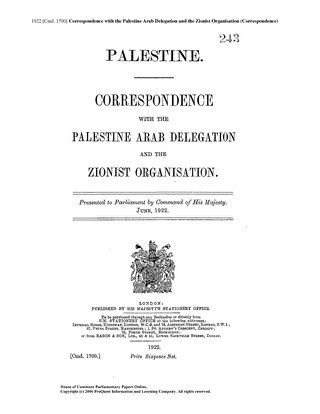
The Churchill White Paper of 3 June 1922 was drafted at the request of Winston Churchill, then Secretary of State for the Colonies, partly in response to the 1921 Jaffa Riots. The official name of the document was Palestine: Correspondence with the Palestine Arab Delegation and the Zionist Organisation. The white paper was made up of nine documents and "Churchill's memorandum" was an enclosure to document number 5. While maintaining Britain's commitment to the Balfour Declaration and its promise of a Jewish national home in Mandatory Palestine, the paper emphasized that the establishment of a national home would not impose a Jewish nationality on the Arab inhabitants of Palestine. To reduce tensions between the Arabs and Jews in Palestine the paper called for a limitation of Jewish immigration to the economic capacity of the country to absorb new arrivals. This limitation was considered a great setback to many in the Zionist movement, though it acknowledged that the Jews should be able to increase their numbers through immigration rather than sufferance.
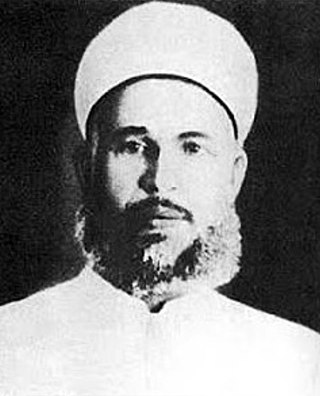
Izz ad-Din Abd al-Qadar ibn Mustafa ibn Yusuf ibn Muhammad al-Qassam was a Syrian Muslim preacher, and a leader in the local struggles against British and French Mandatory rule in the Levant, and a militant opponent of Zionism in the 1920s and 1930s.
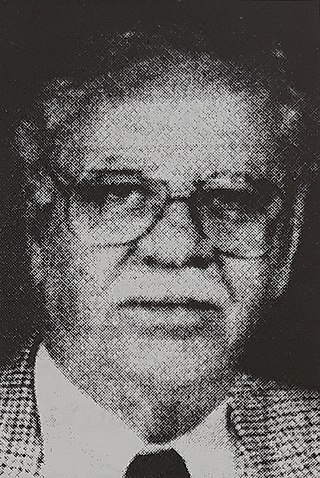
Awni Abd al-Hadi, aka Auni Bey Abdel Hadi was a Palestinian political figure. He was educated in Beirut, Istanbul, and at the Sorbonne University in Paris. His wife was Tarab Abd al-Hadi, a Palestinian activist and feminist.
The Palestinian Arab Party was a political party in Palestine established by the influential Husayni family in May 1935. Jamal al-Husayni was the founder and chairman. Emil Ghuri was elected general secretary until the end of the British Mandate in 1947. Other leaders of the party included Saed al-dean Al-Aref, Rafiq al-Tamimi, Tawfiq al-Husayni, Anwar al-Khatib, Kamil al-Dajani, and Yusuf Sahyun.

Jamal al-Husayni (1894–1982), was born in Jerusalem and was a member of the highly influential and respected Husayni family.

Musa Kazim Pasha al-Husayni held a series of senior posts in the Ottoman administration. He belonged to the prominent al-Husayni family and was mayor of Jerusalem (1918–1920). He was dismissed as mayor by the British authorities and became head of the nationalist Executive Committee of the Palestine Arab Congress from 1922 until 1934. His death was believed to have been caused by injuries received during an anti-British demonstration.

Husayni is the name of a prominent Palestinian Arab clan formerly based in Jerusalem, which claims descent from Husayn ibn Ali.
The Palestinian people are an ethnonational group with family origins in the region of Palestine. Since 1964, they have been referred to as Palestinians, but before that they were usually referred to as Palestinian Arabs. During the period of the British Mandate, the term Palestinian was also used to describe the Jewish community living in Palestine.
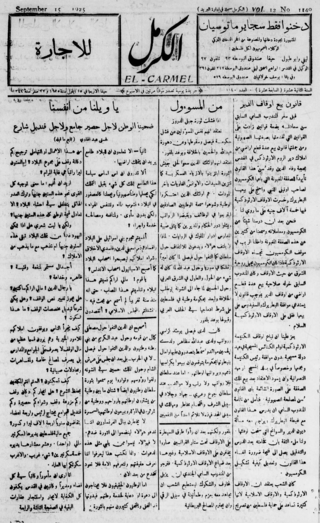
Al-Karmil or El-Carmel was a bi-weekly Arabic-language newspaper founded toward the end of Ottoman imperial rule in Palestine. Named for Mount Carmel in the Haifa district, the first issue was published in December 1908, with the stated purpose of "opposing Zionist colonization".

Muhammad 'Izzat Darwazeh was a Palestinian politician, historian, and educator from Nablus. Early in his career, he worked as an Ottoman bureaucrat in Palestine and Lebanon. Darwaza had long been a sympathizer of Arab nationalism and became an activist of that cause following the Arab Revolt against the Ottoman Empire in 1916, joining the nationalist al-Fatat society. As such, he campaigned for the union of Greater Syria and vehemently opposed Zionism and foreign mandates in Arab lands. From 1922 to 1927, he served as an educator and as the principal at the an-Najah National School where he implemented a pro-Arab nationalist educational system, promoting the ideas of Arab independence and unity. Darwaza's particular brand of Arab nationalism was influenced by Islam and his beliefs in Arab unity and the oneness of Arabic culture.

Muhammad Rafiq al-Tamimi was a Palestinian Arab educator and political figure in the 20th century. He was appointed to the Arab Higher Committee in 1945 and was the chairman of the Palestinian Arab paramilitary scout movement, al-Najjada (1945–47).

Rashid al-Haj Ibrahim (1889–1953) was a Palestinian Arab banker and a leader of the Independence Party of Palestine (al-Istiqlal). He was one of the most influential Arab leaders of Haifa in the first half of the 20th century and played a leading role in both the 1936–39 Arab revolt and the 1948 Battle of Haifa.
Mu'in al-Madi was a Palestinian Arab politician and member of the Arab Higher Committee. He was one of the founders of the al-Istiqlal (Independence) party, which espoused Arab nationalism. Al-Madi helped organize the 1936–39 Arab revolt in Palestine.

Sa'id al-Khadra (1895-1954) was a Palestinian Arab politician, lawyer, and newspaper columnist. As an Istiqlal leader, he helped organize anti-British and anti-Zionist activities in Palestine, including the 1936–39 Arab revolt, which resulted in his three-year imprisonment.
The Palestine Arab Congress was a series of congresses held by the Palestinian Arab population, organized by a nationwide network of local Muslim-Christian Associations, in the British Mandate of Palestine. Between 1919 and 1928, seven congresses were held in Jerusalem, Jaffa, Haifa and Nablus. Despite broad public support their executive committees were never officially recognised by the British, who claimed they were unrepresentative. After the British defeat of Ottoman forces in 1918, the British established military rule and (later) civil administration of Palestine. The Palestine Arab Congress and its organizers in the Muslim-Christian Associations were formed when the country's Arab population began coordinated opposition to British policies.
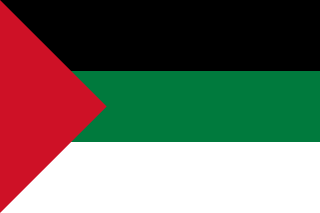
Arab nationalism is a political ideology asserting that Arabs constitute a single nation. As a traditional nationalist ideology, it promotes Arab culture and civilization, celebrates Arab history, glorifies the Arabic language as well as Arabic literature, and calls for the rejuvenation of Arab society through total unification. It bases itself on the premise that the people of the Arab world — from the Atlantic Ocean to the Arabian Sea — constitute one nation bound together by a common identity: ethnicity, language, culture, history, geography, and politics.

The Arab Higher Committee or the Higher National Committee was the central political organ of Palestinian Arabs in Mandatory Palestine. It was established on 25 April 1936, on the initiative of Haj Amin al-Husayni, the Grand Mufti of Jerusalem, and comprised the leaders of Palestinian Arab clans and political parties under the mufti's chairmanship. The committee was outlawed by the British Mandatory administration in September 1937 after the assassination of a British official.

Abd al-Qadir al-Husayni, also spelled Abdul Qadir al-Husseini, was a Palestinian Arab nationalist and fighter who in late 1933 founded the secret militant group known as the Organization for Holy Struggle, which he and Hasan Salama commanded as the Army of the Holy War during the 1936–1939 Arab revolt and during the 1948 war.

Palestinian nationalism is the national movement of the Palestinian people that espouses self-determination and sovereignty over the region of Palestine. Originally formed in the early 20th century in opposition to Zionism, Palestinian nationalism later internationalized and attached itself to other ideologies; it has thus rejected the occupation of the Palestinian territories by the government of Israel since the 1967 Six-Day War. Palestinian nationalists often draw upon broader political traditions in their ideology, such as Arab socialism and ethnic nationalism in the context of Muslim religious nationalism. Related beliefs have shaped the government of Palestine and continue to do so.















